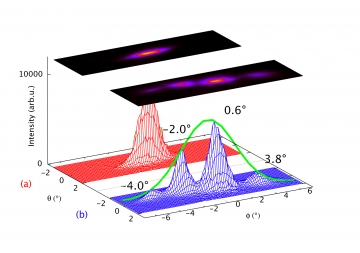Capillary guiding
 We are investigating the so called guiding effect [Phys. Rev. Lett. 88 (2002) 133201] in insulating capillaries. It has been found, that charged particles (in our case highly charged ions) are able to pass through a capillary, which is tilted with respect to the incident beam axis, due to the fact, that charge patches at the inner wall from previous ion impact lead to deflection of the successors. Furthermore these patches assemble in a self-organized process and eventually, after some charge-up periode, one finds ions which pass the capillary outside of the geometrically allowed direction in their oriniginal charge-state.
We are investigating the so called guiding effect [Phys. Rev. Lett. 88 (2002) 133201] in insulating capillaries. It has been found, that charged particles (in our case highly charged ions) are able to pass through a capillary, which is tilted with respect to the incident beam axis, due to the fact, that charge patches at the inner wall from previous ion impact lead to deflection of the successors. Furthermore these patches assemble in a self-organized process and eventually, after some charge-up periode, one finds ions which pass the capillary outside of the geometrically allowed direction in their oriniginal charge-state.
 First investigations in our laboratory were carried out using etched nano capillaries in a PET foil. These nano-capillaries had diameters of the order of 100nm at a length of several microns. A beam of highly-charged-ions was used to irradiate the foil, which could be tilted against the beam axis. The transmitted ions were recorded with a position sensitive detector system, allowing a time resolved determination of the deflection.
First investigations in our laboratory were carried out using etched nano capillaries in a PET foil. These nano-capillaries had diameters of the order of 100nm at a length of several microns. A beam of highly-charged-ions was used to irradiate the foil, which could be tilted against the beam axis. The transmitted ions were recorded with a position sensitive detector system, allowing a time resolved determination of the deflection.
Latest experiments were using a single, macroscopic glass tube, with a diameter of about 170 microns and a total length of more than 10 mm, showing also guiding up to several degrees, as illustrated in the figure. One can see the 2D image of the direct beam collimated by a 500 micron aperture at the capillary position (red) in comparison to the ions transmitted through the capillary (blue) at 4 different tilt angles.
The experiments have been carried out with our ECR ion source, using 4.5keV Ar9+ projectiles.
Contact: Gregor Kowarik
Thanks for contributions to Coline Lemaignan
and our collaboration partners Réka Bereczky and Kaloy Tökési from ATOMKI, Debrecen (HU).
Publications:
M. Fürsatz, W. Meissl, S. Pleschko, I.C. Gebeshuber, N. Stolterfoht, HP. Winter, and F. Aumayr
Charging and discharging of nano-capillaries during ion-guiding of multiply charged projectiles
J. Phys. Conf. Proc. HCI 58 (2007) 319
R. J. Bereczky, G. Kowarik, F. Aumayr, and K. Tökési
Transmission of 4.5 keV Ar9+ ions through a single glass macro-capillary
Nuclear Instruments and Methods in Physics Research B 267 (2009) 317 - 320
G. Kowarik, R. J. Bereczky, F. Aumayr, and K. Tökési
Production of a microbeam of slow highly charged ions with a single microscopic glass capillary
Nuclear Instruments and Methods in Physics Research B,in press
Back to Ion-surface-interaction